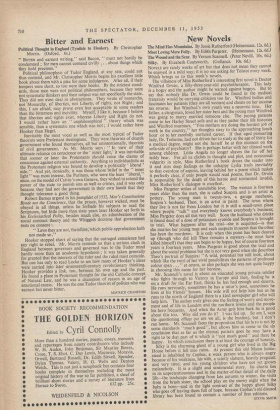Bitter and Earnest
Political Thought in England (Tyndale to Hooker). By Christopher Morris. (Oxford. 6s.) " Brrrsa and earnest writing," said Bacon, " must not hastily be condemned ; for men cannot contend civilly . . about things which they hold precious."
Political philosophe;s of Tudor England, at any rate, could not thus contend, and Mr. Christopher Morris begins his excellent little book about them with a plea for some indulgence. After all, if their tempers were short, so too were their books. By the strictest stand- ards, those men were not political philosophers, because they were not systematic thinkers and their subject was not specifically the state. They did not even deal in abstractions. They wrote of monarchs, not Monarchy, of liberties, not Liberty, of rights, not Right ; and this, I am afraid, may prove even less acceptable to some readers than the bitterness and incivility. Myself, I like it, because I believe that liberties and rights exist, whereas Liberty and Right do not. I would rather have an " unphilosophical " theory which was sensible, than a systematic one which was not ; I would rather have Hooker than Hegel.
Inevitably the most vocal as well as the most typical of Tudor theorists were Protestant theologians. They were theorists of church government who found themselves, all but unintentionally, theorists of civil government. As Mr. Morris says : " In view of their ultimate reliance on conscience or the ' inner light,' it was inevitable that sooner or later the Protestants should voice the claims of conscience against external authority. Anything so individualistic as the Protestant religion was bound to develop a politically liberal ' side." And yet, ironically, it was those whose belief in the " inner light" was most intense, the Puritans, who were the least "liberal," since, on the model of Calvin's own Geneva, they wished to extend the power of the state to punish sins as well as crimes, and it was only, because they had not the government in their own hands that they thought tolerance a good thing.
Robert Barnes argued in his pamphlet of 1532, Men's Constitutions Bynde not the Conscience, that the prince, however wicked, must be obeyed in all things, unless he forbade his subjects to read the Scriptures, but little more than sixty years later Hooker set forth in his Ecclesiastical Polity, besides much else, an adumbration of the social contract theory and the Whiggish doctrine that government rests on consent : " Laws they are not, therefore, which public approbation hath not made so."
Hooker stopped short of saying that the outraged conscience had any right to rebel. Mr. Morris reminds us that a serious clash in England between governors and governed was to the Tudor mind hardly more than an academic hypothesis; it was taken generally for granted that the interests of the ruler and the ruled must coincide. But one has only to read Locke to see how many of Hooker's ideas were carried into later seventeenth-century revolutionary thinking. Hooker provides a link, too, between his own age and the past. He found a place in Protestant thought for the old Catholic concept of Natural Law, and he was a champion of reason in an age of emotional excess. He was the one Tudor theorist of politics who was earnest but never bitter.
MAURICE CRANSTON MAURICE CRANSTON


































 Previous page
Previous page